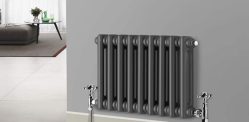"it is best to turn the heating on as we feel the chill more."
As the colder weather sets in, we have all considered if it is time to put the heating on.
While many try to put it off by wearing lots of layers inside the house, there is actually an ideal time to flick the switch.
Experts have revealed that there is a correct temperature and date for turning the heating on, which is bound to save disagreements in countless households across the UK.
But when is it?
Matthew Jenkins, a Heating Expert at MyJobQuote, advises switching on the central heating when average outdoor temperatures dip below 15°C.
He says: “Outdoor temperatures of 15 degrees is when most people notice a change in temperature enough to comment on their discomfort.”
Meanwhile, heating technology expert Jess Steele echoed this advice.
“Whilst there isn’t an optimum time to switch heating on, our research shows that once temperatures are below 15°C, usually in the middle of October, it is best to turn the heating on as we feel the chill more.
“By the end of the month, even the hardiest among us will have our heating on to keep warm as temperatures are predicted to drop further.”
Based on the colder weather across the UK, the exact date to turn the heating on is October 20.
Most people find that the best temperature in autumn and winter is between 18 to 21°C.
GOV.UK recommends that consistent indoor temperatures should not dip drastically below 15°C as this can heighten the risk of negative health effects, especially if you live with any elderly relative.
When it comes to heating the home, households have differing opinions about whether it is turning it on, what the temperature should be and how long should it be on.
But a common topic is whether to leave the heating on all day on low, or to only turn it on when you need it.
Unfortunately, this question is one without a straightforward answer.
Experts at the Energy Saving Trust say the idea of it being cheaper to leave the heating on low all day is a “myth”.
This is mainly due to problems such as home insulation since older or more draughty homes will allow heat to escape through windows and doors.
With poor insulation, the boiler will have to work harder to keep the home’s temperature at a set level, which will use more energy and cost more money.
According to the Energy Saving Trust, if the heating is kept on all day, you are losing energy all day. So it is better to heat your home only when you need it.
Despite this, some engineers have said that keeping your boiler on low all the time can save you some money.
This is because turning your boiler on and off regularly will mean it needs to use more energy to heat your home to your desired temperature.
If your home is well-insulated, you may be better off leaving the heating on low as good insulation will prevent too much heat loss from occurring since your thermostat will work with your boiler to maintain the temperature with relative ease.






























































